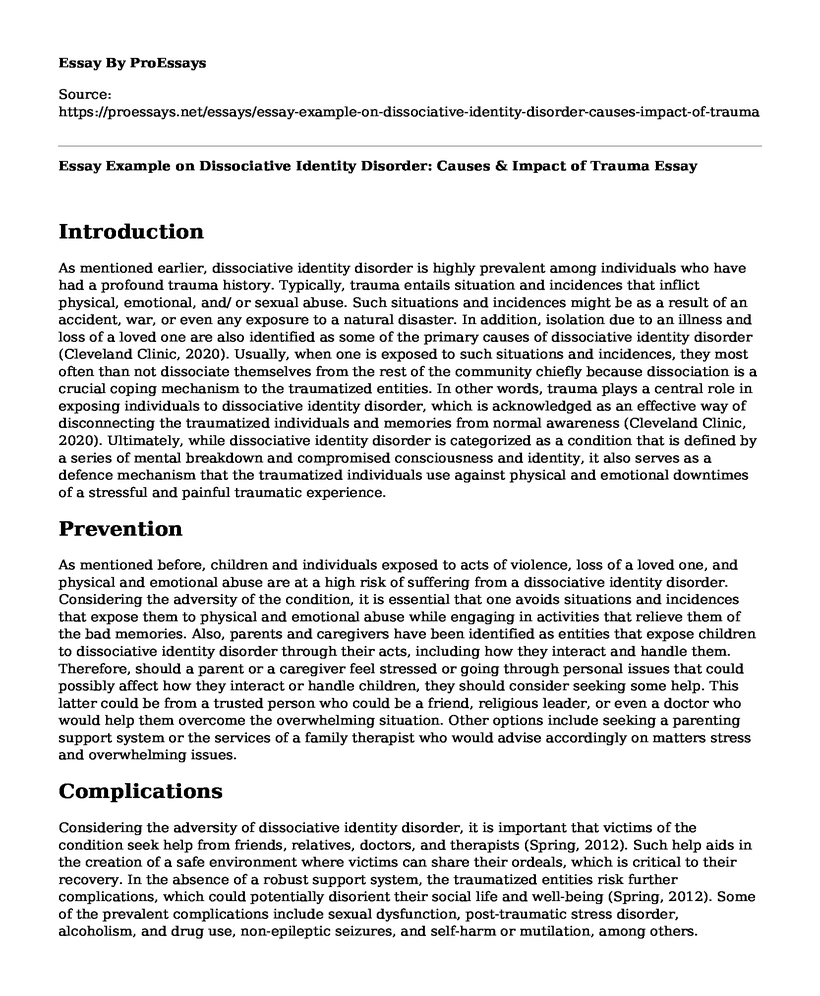Introduction
As mentioned earlier, dissociative identity disorder is highly prevalent among individuals who have had a profound trauma history. Typically, trauma entails situation and incidences that inflict physical, emotional, and/ or sexual abuse. Such situations and incidences might be as a result of an accident, war, or even any exposure to a natural disaster. In addition, isolation due to an illness and loss of a loved one are also identified as some of the primary causes of dissociative identity disorder (Cleveland Clinic, 2020). Usually, when one is exposed to such situations and incidences, they most often than not dissociate themselves from the rest of the community chiefly because dissociation is a crucial coping mechanism to the traumatized entities. In other words, trauma plays a central role in exposing individuals to dissociative identity disorder, which is acknowledged as an effective way of disconnecting the traumatized individuals and memories from normal awareness (Cleveland Clinic, 2020). Ultimately, while dissociative identity disorder is categorized as a condition that is defined by a series of mental breakdown and compromised consciousness and identity, it also serves as a defence mechanism that the traumatized individuals use against physical and emotional downtimes of a stressful and painful traumatic experience.
Prevention
As mentioned before, children and individuals exposed to acts of violence, loss of a loved one, and physical and emotional abuse are at a high risk of suffering from a dissociative identity disorder. Considering the adversity of the condition, it is essential that one avoids situations and incidences that expose them to physical and emotional abuse while engaging in activities that relieve them of the bad memories. Also, parents and caregivers have been identified as entities that expose children to dissociative identity disorder through their acts, including how they interact and handle them. Therefore, should a parent or a caregiver feel stressed or going through personal issues that could possibly affect how they interact or handle children, they should consider seeking some help. This latter could be from a trusted person who could be a friend, religious leader, or even a doctor who would help them overcome the overwhelming situation. Other options include seeking a parenting support system or the services of a family therapist who would advise accordingly on matters stress and overwhelming issues.
Complications
Considering the adversity of dissociative identity disorder, it is important that victims of the condition seek help from friends, relatives, doctors, and therapists (Spring, 2012). Such help aids in the creation of a safe environment where victims can share their ordeals, which is critical to their recovery. In the absence of a robust support system, the traumatized entities risk further complications, which could potentially disorient their social life and well-being (Spring, 2012). Some of the prevalent complications include sexual dysfunction, post-traumatic stress disorder, alcoholism, and drug use, non-epileptic seizures, and self-harm or mutilation, among others. Typically, to avoid such complications, family, friends, and relatives of the traumatized individual should ensure that they continuously offer a support system, considering its influence in the victims' recovery path.
Conclusion
In conclusion, dissociative identity disorder is characterized by disruptions and breakdowns of memory, consciousness, and perception. Usually, dissociative identity disorder is prevalent amongst females owing to their high vulnerability aspects. Those who develop signs od dissociative identity disorder have previous or current encounters of physical or emotional abuse that traumatize them, thus disconnecting themselves from the rest of the community. In the event that one develops signs of dissociative identity disorder, friends and relatives should consider seeking help while creating a resourceful support system that would facilitate the victim’s recovery path. In the absence of a robust support system, victims of dissociative identity disorder are highly likely to suffer from complications such as mutilation, post-traumatic stress disorder, and sexual dysfunction, among others. Therefore, it is important to help those who suffer from DID, particularly by ensuring that they avoid situations and incidences that expose them.
References
Cleveland Clinic. (2020). Multiple Personality Disorder: Causes, Symptoms, Diagnosis, Treatment. Retrieved 8 June 2020, from https://my.clevelandclinic.org/health/diseases/9792-dissociative-identity-disorder-multiple-personality-disorder
Spring, C. (2012). What are the signs and symptoms of dissociative identity disorder? | PODS. Retrieved 8 June 2020, from https://information.pods-online.org.uk/what-are-the-signs-and-symptoms-of-dissociative-identity-disorder/
Cite this page
Essay Example on Dissociative Identity Disorder: Causes & Impact of Trauma. (2023, Aug 27). Retrieved from https://proessays.net/essays/essay-example-on-dissociative-identity-disorder-causes-impact-of-trauma
If you are the original author of this essay and no longer wish to have it published on the ProEssays website, please click below to request its removal:
- Essay Sample: Interview on a Personality's Lifespan Development
- Crime and Mental Illness Essay
- Nurses' Mental and Physical Health: Challenges and Implications - Research Paper
- Essay Sample on Mr. Wilko's Self-Assessment: Is It Real or Pretence?
- Essay on Incompetence of Andrew Wakefield's Autism
- Paper Sample on 4 Studies Show How Exercise Can Help Alleviate Depression
- Violent Video Games and How There is No Proven Link between Them and Increased Aggressive Behaviors - Free Paper







